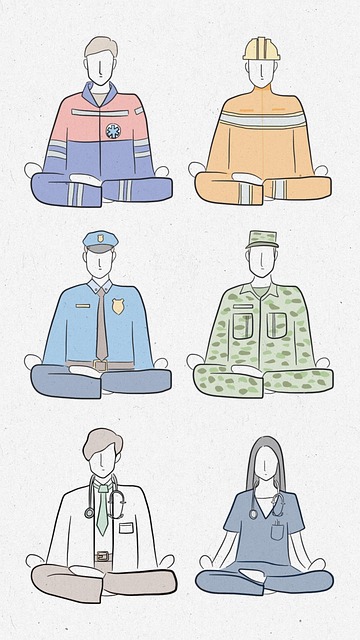Mental health crisis hotlines serve as 24/7 resources for young adults struggling with emotional distress, offering immediate support and guidance. These hotlines focus on building self-esteem, a critical aspect of mental health journey navigation. Through trained professionals, they connect youth to therapy for young adults, promote cultural sensitivity in mental healthcare, encourage healthy self-care, and foster inner strength. Post-crisis care emphasizes tailored therapy sessions, consistent self-care routines, and culturally competent healthcare providers to prevent recurring mental health episodes and enhance overall well-being. By addressing low self-esteem and providing emotional regulation tools, these services empower young adults to take control of their mental health and embrace a transformative journey.
In today’s fast-paced world, mental health crisis hotline support services play a crucial role in assisting young adults navigating turbulent emotions. This article explores various facets of these lifeline resources, from understanding the significance of hotlines to delving into the therapeutic benefits tailored for young adults. We also dissect challenges in accessing crisis services and propose solutions, emphasizing the importance of self-esteem as a foundational pillar in youth mental health support. Additionally, we discuss post-crisis strategies and prevention tactics to foster resilience.
- Understanding Mental Health Crisis Hotlines: A Lifeline for Young Adults
- The Role of Self-Esteem in Youth Mental Health Support
- How Therapy Can Empower and Heal Young Adult Callers
- Accessing Crisis Hotline Services: Challenges and Solutions
- Building Resilience: Post-Crisis Support and Prevention Strategies
Understanding Mental Health Crisis Hotlines: A Lifeline for Young Adults

Mental Health Crisis Hotlines serve as a vital lifeline for young adults grappling with emotional distress and mental health challenges. These 24/7 services provide immediate support, offering a safe space to express fears, anxieties, or feelings of despair without judgment. Trained professionals on the other end are equipped to listen, offer guidance, and connect individuals to appropriate resources such as therapy for young adults.
Understanding one’s self-esteem plays a crucial role in the emotional healing processes these hotlines facilitate. Many young adults struggle with low self-worth, often stemming from internalized trauma or external pressures. The support received over the phone can help deconstruct these negative thought patterns and equip individuals with conflict resolution techniques to navigate their mental health journeys more effectively.
The Role of Self-Esteem in Youth Mental Health Support

The support services offered by mental health crisis hotlines play a pivotal role in fostering resilience and promoting healing among young adults grappling with various mental health challenges. One critical aspect often overlooked is the intricate link between self-esteem and youth mental health. Many young individuals struggling with anxiety, depression, or other issues may have low self-worth, which can significantly impede their journey towards recovery.
Building self-esteem becomes an essential component of therapy for young adults. Cultural sensitivity in mental healthcare practice is crucial here, ensuring that support services cater to diverse backgrounds and experiences. Through inner strength development and encouragement, hotlines can empower youth to adopt healthy self-care practices. By boosting self-confidence, these initiatives enable young people to navigate their mental health journeys with renewed hope and a sense of control, ultimately enhancing their overall well-being.
How Therapy Can Empower and Heal Young Adult Callers

For young adults grappling with mental health challenges, accessing therapy can be a powerful tool for empowerment and healing. This form of support provides a safe space for individuals to explore their thoughts and emotions, fostering self-awareness and understanding. Through psychotherapy, young callers learn valuable conflict resolution techniques, enabling them to navigate interpersonal relationships more effectively. By encouraging open dialogue, therapy helps dispel negative thought patterns, boosting self-esteem and building inner strength development. It equips them with coping mechanisms to manage stress, anxiety, or depression, thereby preventing burnout—a significant concern among healthcare providers who often employ these strategies in their work.
The therapeutic process allows for the exploration of underlying issues, offering insights into behaviors and triggers that contribute to mental health crises. By gaining a deeper understanding of themselves, young adults can make more informed decisions about their well-being. This empowerment extends beyond individual healing; it equips them with resilience, encouraging proactive engagement in their mental health care. In a supportive environment, they learn to recognize signs of distress early on, ensuring timely intervention and potentially averting severe episodes. Thus, therapy becomes a catalyst for positive change, enabling young adults to navigate life’s challenges with enhanced emotional intelligence and increased confidence.
Accessing Crisis Hotline Services: Challenges and Solutions

Accessing crisis hotline support services can be a complex and challenging task for young adults struggling with mental health issues. One of the primary hurdles is the lack of awareness about these resources, especially among those who might be reluctant to seek help due to stigma associated with mental illness. Many young people are unsure of how or where to begin when facing a crisis, leading to delays in receiving critical support.
To address these challenges, various strategies have been employed. Mindfulness meditation programs and empathy-building workshops can equip individuals with coping mechanisms and reduce anxiety surrounding therapy for young adults. Mental illness stigma reduction efforts play a vital role in encouraging open dialogue and fostering an environment where seeking help is normalized. Additionally, expanding access to crisis hotline services through digital platforms ensures that support is readily available, breaking down geographical barriers and reaching those who might otherwise struggle to connect with traditional support systems.
Building Resilience: Post-Crisis Support and Prevention Strategies

After a mental health crisis, supporting individuals with post-crisis care is vital to build resilience and prevent future episodes. This includes a multifaceted approach focusing on both therapeutic interventions and proactive self-care strategies. Many young adults, in particular, can benefit from specialized therapy tailored to their age group, addressing issues like low self-esteem and providing tools for emotional regulation.
Encouraging the development of a consistent self-care routine is another crucial component. This might involve incorporating mindfulness meditation practices, as research suggests they enhance mental well-being. Additionally, healthcare provider training in cultural competency ensures that support is sensitive to diverse backgrounds, fostering trust and effectiveness. These strategies collectively contribute to long-term mental health management and foster resilience against future crises.
Mental health crisis hotline support services play a vital role in empowering young adults, addressing critical issues like self-esteem, and offering therapeutic interventions. By providing accessible resources and post-crisis care, these hotlines not only offer immediate relief but also foster resilience. Integrating therapy into crisis support enhances long-term well-being for young callers. Through collaborative efforts to overcome challenges in access, these services can become even more effective in serving the unique needs of this demographic, ensuring a brighter and healthier future.













